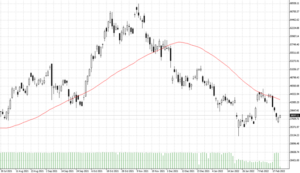
23.02.2022 – In the hubbub of the Ukraine crisis, a news item has been lost that should interest crypto disciples. The FBI has set up a new cyber-crime unit to look after money flows on the darknet. Which is a hugely bearish fact for Bitcoin.
The Virtual Asset Exploitation Unit (VAXU) will analyse the blockchain of cryptocurrencies – and follow the money trail in cyber crime. The new development particularly hits Bitcoin, which has been the extortion ransom of choice for IT gangsters. How much criminal tokens are floating around in the market is unclear. The fact is, however, that so far most companies that have been blackmailed via ransomware have had to pay bitcoin. For example, the Russian gang REvil demanded around 70 million dollars in Bitcoin in the Kaseya hack in the summer of 2021. Dollar or Euro short, BTC long. The increased activities of Western investigators could explain the downward trend in Bitcoin. From a chart perspective, a recovery and a recapture of the 50-day line should be in the offing.

Source: Bernstein Bank GmbH
Contrary to popular belief, Bitcoin trades are by no means anonymous. It is true that money can be quickly transferred anywhere in the world, and there is no need for annoying paperwork at a bank that might ask questions. That’s why IT gangsters love BTC. But in a public directory – the public ledger – every transaction can be tracked until it is deposited in its destination wallet. Experts therefore talk about BTC being pseudonymous, but not anonymous.
Hackers stopped
“Follow the money” is therefore the path to success. And there are already a few of them. One particular coup: in the summer of 2021, the FBI recovered around 2.3 million dollars of the ransom that had been paid for the Colonial Pipeline extortion. The Russian extortion kings of REvil, which cooperated with a gang called Dark Side, are also said to have been behind the hack. The detection was a wake-up call for the criminal industry.
Cryptocurrency tracking also led to the arrest of the mastermind behind the spectacular Twitter hack in July 2020, when the Twitter accounts of some 130 celebrities were hacked, including Kim Kardashian, Elon Musk, Bill Gates and Joe Biden. The perpetrator used the accounts in a social engineering scam to persuade Twitter users to transfer bitcoin. Around $100,000 was quickly raised.
A couple was just arrested in Manhattan. Both had laundered tokens that a hacker had stolen from the Bitfinex platform around six years earlier. The roughly 120,000 Bitcoin were once worth 71 million dollars, but in between they were worth 4.5 billion dollars. Of that, around 3.6 billion was still left at the time of the arrest. Meanwhile, the far more discreet Monero has become the currency of choice for many criminals. Monero long, BTC short.
Cyber War
Conclusion: We are witnessing a development that investors should keep a close eye on. Especially as the Ukraine crisis is bringing the situation to a head. It is quite possible that Russia will unleash its hackers on Western industry. Incidentally, the IT security firm Chainalysis suspects that around three quarters of all ransomware flowed to Russia in 2021. In total, it was last year and 400 million dollars. If the FBI identifies and eliminates the perpetrators, which has apparently already been achieved in the case of Emotet and REvil – in the case of REvil allegedly with the help of the Russian FSB – the demand from criminal activities will fall for BTC.
Furthermore, there is a second major drag: assets that do not yield will suffer in the event of interest rate hikes. The Federal Reserve is likely to turn the interest rate screw soon. Bernstein Bank is keeping an eye on the topic for you – we wish you good luck with your trades and investments!
Important Notes on This Publication:
The content of this publication is for general information purposes only. In this context, it is neither an individual investment recommendation or advice nor an offer to purchase or sell securities or other financial products. The content in question and all the information contained therein do not in any way replace individual investor- or investment-oriented advice. No reliable forecast or indication for the future is possible with respect to any presentation or information on the present or past performance of the relevant underlying assets. All information and data presented in this publication are based on reliable sources. However, Bernstein Bank does not guarantee that the information and data contained in this publication is up-to-date, correct and complete. Securities traded on the financial markets are subject to price fluctuations. A contract for difference (CFD) is also a financial instrument with leverage effect. Against this backdrop, CFD trading involves a high risk up to the point of total loss and may not be suitable for all investors. Therefore, make sure that you have fully understood all the correlating risks. If necessary, ask for independent advice. CFDs are complex instruments and are associated with the high risk of losing money quickly because of the leverage effect. 68% of retail investor accounts lose money trading CFD with this provider. You should consider whether you understand how CFD work and whether you can afford to take the high risk of losing your money.
